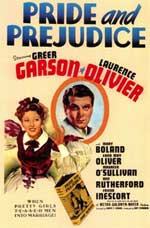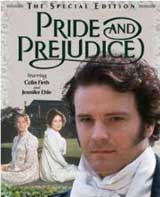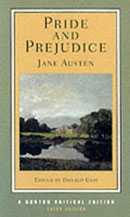Pride & Prejudice 《傲慢与偏见》(精讲之一)
影片对白
 Mrs. Bennet: How well you dance, Mr. Bingley. My daughter Jane is a splendid dancer, is she not?
Mrs. Bennet: How well you dance, Mr. Bingley. My daughter Jane is a splendid dancer, is she not?
Bingley: She is indeed. (to Elizabeth) Your friend Miss Lucas is a most amusing young woman.
Elizabeth: Oh, yes, I adore her.
Mrs. Bennet: It is a pity she's not more handsome.
Elizabeth: Mama!
Mrs. Bennet: Oh, but Lizzie would never admit that she's plain. Of course it's my Jane who's considered the beauty of the county.
Elizabeth & Jane: No, Mama, please!
Mrs. Bennet: When she was 15, a gentleman was so much in love with her, that I was sure he would make her an offer. However, he did write her some very pretty verses.
Elizabeth: And that put paid to it. I wonder who discovered the power of poetry in driving away love.
Darcy: I thought poetry was the food of love.
Elizabeth: Of a fine, stout love, it may. But if it is only a vague inclination one poor sonnet will kill it.
Darcy: So what do you recommend to encourage affection?
Elizabeth: Dancing. Even if one's partner is barely tolerable.
Jane: Mr Bingley is just what a young man ought to be. Sensible, good-humoured...
Elizabeth: Handsome, conveniently rich...
Jane: You know perfectly well I do not believe marriage should be driven
by thoughts of money.
Elizabeth: I agree entirely. Only the deepest love will persuade me into matrimony, which is why I'll end up an old maid.
Jane: Do you really believe he liked me, Lizzie?
Elizabeth: Jane, he danced with you most of the night, and stared at you for the rest of it. But I give you leave to like him. You've liked many a stupider person. You're a great deal too apt to like people in general, you know. All the world is good and agreeable in your eyes.
Jane: Not his friend. I still can't believe what he said about you.
Elizabeth: Mr. Darcy? I could more easily forgive his vanity had he not wounded mine. But no matter, I doubt we shall ever speak again.
妙词佳句,活学活用
1. adore
Adore 有好几种意思,我们一起来看一下:
A. If you adore someone, you feel great love and admiration for him or her. 敬爱,敬重;爱慕
e.g. She adored her parents and would do anything to please them.
B. If you adore something, you like it very much. 非常喜欢,痴迷
e.g. I adore apple very much and eat two a day.
2. make an offer
这是口语中很常用的词组,其意义取决于作为名词的offer一词的不同含义,如在电影《情归巴黎》中有一句台词是:
You never said a word about planning to make an offer to Patrick. (关于你要跟Patrick合并的事情你一个字都没提过。)
这里的翻译是意译,我们可以看出来make an offer是"出价"的意思。
而在本电影的台词里,这个make an offer的意思显然不同,应该是"求婚"的意思。offer一词本身就有"求婚"的意思,所以"向某人求婚"我们可以说propose to sb. 或者make an offer to sb.
3. put paid to 结束……,了结……(口语)
这是一个挺有意思的短语,If an unexpected event puts paid to someone's hopes, chances, or plans, it completely ends or destroys them. 主要在说英式英语的国家中使用。
The series of terrible blind dates put paid to her dream of an ideal marriage.
一系列可怕的相亲断送了她对理想婚姻的梦想。
4. end up/end up with 以……结束,以……告终
If you end up doing something or end up in a particular state, you do that thing or get into that state even though you did not originally intend to.
e.g. Every time they went dancing they ended up in a bad mood.
他们每次出去跳舞都不欢而散。
She could have ended up a millionairess.
她本来可以成为一个百万富翁的。
文化面面观
 简·奥斯汀的名著《傲慢与偏见》是最受欢迎的改编题材,自小说诞生65年来,曾分别在1938、1952、1967、1980和1995被改编为电视剧,其中1995年的版本由柯林o佛茨主演,曾给观众留下了比较深刻的印象,这部小说之前只在1940年被改编为电影一次,而这一次这部带着智慧、激情与浪漫的故事再次与观众见面。
简·奥斯汀的名著《傲慢与偏见》是最受欢迎的改编题材,自小说诞生65年来,曾分别在1938、1952、1967、1980和1995被改编为电视剧,其中1995年的版本由柯林o佛茨主演,曾给观众留下了比较深刻的印象,这部小说之前只在1940年被改编为电影一次,而这一次这部带着智慧、激情与浪漫的故事再次与观众见面。
 相比较美国影片,英国影片具有更加清澈的情节起伏,而美国影片则一向是以功利性的巨大转折带给人心灵震撼,虽然前者看起来似乎有些平淡,但却更适合诠释这种经历时光洗刷的经典题材,也更适合在细腻温情中体现智慧与浪漫的《傲慢与偏见》。
相比较美国影片,英国影片具有更加清澈的情节起伏,而美国影片则一向是以功利性的巨大转折带给人心灵震撼,虽然前者看起来似乎有些平淡,但却更适合诠释这种经历时光洗刷的经典题材,也更适合在细腻温情中体现智慧与浪漫的《傲慢与偏见》。
思想火花

《傲慢与偏见》是简·奥斯汀的代表作。这部作品以日常生活为素材,一改当时社会上流行的感伤小说的内容和矫揉造作的写作方法,生动地反映了18世纪末到19世纪初处于保守和闭塞状态下的英国乡镇生活和世态人情。这部社会风情画式的小说不仅在当时吸引着广大的读者,时至今日,仍给读者以独特的艺术享受。
奥斯汀的小说尽管题材较狭窄,故事略显平淡,但是她善于在日常平凡事物中塑造鲜明的人物形象,不论是伊丽莎白、达西那种作者认为值得肯定的人物,还是魏克翰、柯林斯这类遭到讽刺挖苦的对象,都写得真实动人。同时,奥斯汀的语言也是经过锤炼打磨的,她在对话艺术上讲究幽默讽刺,常以风趣诙谐的语言来烘托人物的性格特征。
考考你
1 他非常喜欢看电影。
2 他向那个漂亮女孩求了婚,但是被拒绝了。
3 雨水让我们的野餐计划泡汤了。
4 如果你不知道自己想要什么,结果往往是你会得到一些你不想要的东西。
Cinderella 2《灰姑娘》2 (精讲之六)考考你 参考答案
1. 这套公寓对我们很合适。
This apartment will do us very nicely.
2. 虽然你配不上她,可她也许真的喜欢你。
You don't deserve her, but she appears to love you.